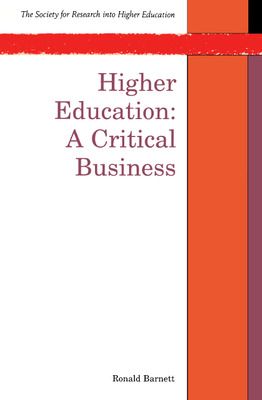Higher Education: A Critical Business
- Access the eBook anytime, anywhere: online or offline
- Create notes, flashcards and make annotations while you study
- Full searchable content: quickly find the answers you are looking for
Part one: Rethinking critical thinking
Conditions of critical thought
Uncritical theory
Discourse and critical potential
The closing of the critical university?
Part two: Towards critical being
Critical being in higher education
Critical action
Critical self-reflection
A curriculum for critical being
Part three: Critique in society
Critical thought in a corporate world
Critical professionalism
Academics as intellectuals
Critical thinking for a learning society
Coda
a critical space
Glossary
Bibliography
Index.
A defining concept of the Western university is that of critical thinking, but that idea is completely inadequate for the changing and unknowable world facing graduates. Instead, we have to displace the idea of critical thinking with the much broader idea of critical being. In this idea, students reflect critically on knowledge but they also develop their powers of critical self-reflection and critical action. This critique is transformatory. An education for critical being calls for a new approach to the process of higher education. It also has implications for the organization and management of universities, and for the relationship of universities to the wider worlds of work, professionalism and intellectual life.
"Barnett reviews what the academy customarily means when it talks about critical thought, explains why that talk is so often shallow and pessimistic, and holds up for contemplation a positive conception of a 'very wide self' formed through education.... He breathes completely new life into the dead notion of academic as intellectual"
- Professor Sheldon Rothblatt, University of California, Berkeley and Royal Institute of Technology, Sweden
Anyone interested in understanding how we might develop universities and higher education for the modern world should read this important book.

